The AMD Threadripper 2990WX 32-Core and 2950X 16-Core Review
by Dr. Ian Cutress on August 13, 2018 9:00 AM ESTHEDT Benchmarks: Encoding Tests
With the rise of streaming, vlogs, and video content as a whole, encoding and transcoding tests are becoming ever more important. Not only are more home users and gamers needing to convert video files into something more manageable, for streaming or archival purposes, but the servers that manage the output also manage around data and log files with compression and decompression. Our encoding tasks are focused around these important scenarios, with input from the community for the best implementation of real-world testing.
Handbrake 1.1.0: Streaming and Archival Video Transcoding
A popular open source tool, Handbrake is the anything-to-anything video conversion software that a number of people use as a reference point. The danger is always on version numbers and optimization, for example the latest versions of the software can take advantage of AVX-512 and OpenCL to accelerate certain types of transcoding and algorithms. The version we use here is a pure CPU play, with common transcoding variations.
We have split Handbrake up into several tests, using a Logitech C920 1080p60 native webcam recording (essentially a streamer recording), and convert them into two types of streaming formats and one for archival. The output settings used are:
- 720p60 at 6000 kbps constant bit rate, fast setting, high profile
- 1080p60 at 3500 kbps constant bit rate, faster setting, main profile
- 1080p60 HEVC at 3500 kbps variable bit rate, fast setting, main profile
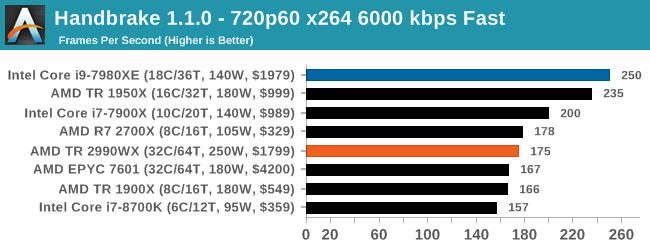
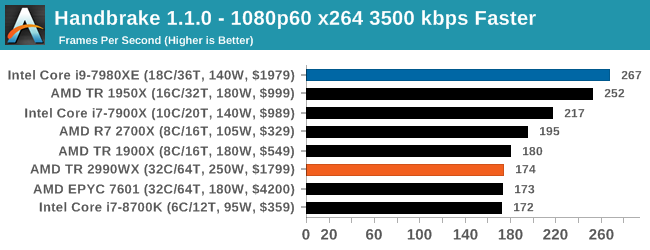
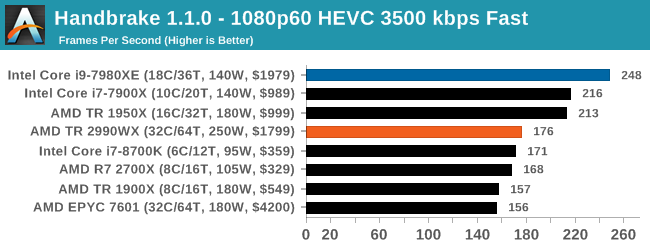
Video encoding is always an interesting mix of multi-threading, memory latency, and compute. The Core i9, with AVX2 instructions, sets a commanding lead in all three tests. The AMD processors seem to fluctuate a bit, with the 1950X and 2700X being the best of the bunch. Unfortunately we didn’t get 2950X results in our initial runs, but I would expect it to be competitive with the Core i9 for sure, given where the 1950X is. However the 2990WX does fall behind a bit.
7-zip v1805: Popular Open-Source Encoding Engine
Out of our compression/decompression tool tests, 7-zip is the most requested and comes with a built-in benchmark. For our test suite, we’ve pulled the latest version of the software and we run the benchmark from the command line, reporting the compression, decompression, and a combined score.
It is noted in this benchmark that the latest multi-die processors have very bi-modal performance between compression and decompression, performing well in one and badly in the other. There are also discussions around how the Windows Scheduler is implementing every thread. As we get more results, it will be interesting to see how this plays out.
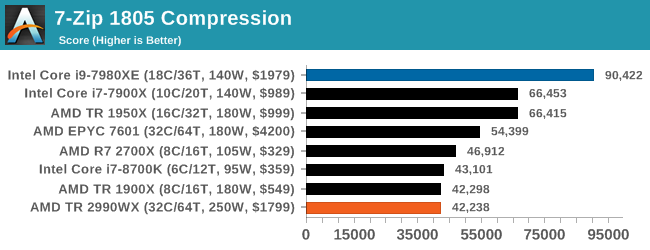
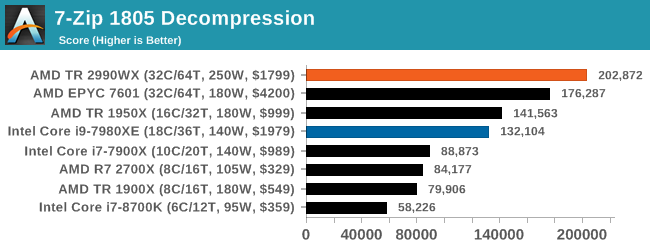
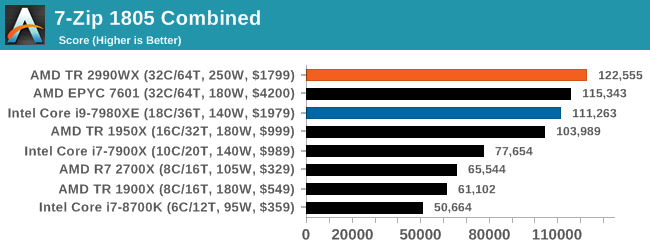
Oh boy, this was an interesting set of tests. When we initially published this review, without commentary, the compression graph with the 2990WX at the bottom was shared around social media like crazy, trying to paint a picture of why AMD performance isn’t great. It was also used in conjuction with Phoronix’s tests, that showed a much better picture on Linux.
But what confuses me is that almost no-one also posted the decompression graph. Here AMD’s 32-core processors take a commanding lead, with the 16/18-core parts being the best of the rest.
If you plan to share out the Compression graph, please include the Decompression one. Otherwise you’re only presenting half a picture.
WinRAR 5.60b3: Archiving Tool
My compression tool of choice is often WinRAR, having been one of the first tools a number of my generation used over two decades ago. The interface has not changed much, although the integration with Windows right click commands is always a plus. It has no in-built test, so we run a compression over a set directory containing over thirty 60-second video files and 2000 small web-based files at a normal compression rate.
WinRAR is variable threaded but also susceptible to caching, so in our test we run it 10 times and take the average of the last five, leaving the test purely for raw CPU compute performance.
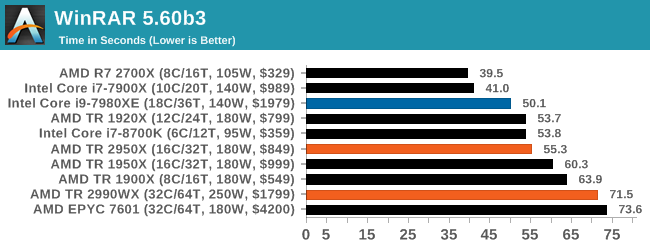
A set of high frequency cores and good memory is usually beneficial, but sometimes some more memory bandwidth and lower latency helps. At the top is AMD’s R7 2700X, with the Intel 10-core just behind. I’m surprised not to see the 8700K in there, perhaps its six cores is not enough. But the higher core count AMD parts struggle to gain traction here, with the 32-core parts taking some sweet time to finish this test.
AES Encryption: File Security
A number of platforms, particularly mobile devices, are now offering encryption by default with file systems in order to protect the contents. Windows based devices have these options as well, often applied by BitLocker or third-party software. In our AES encryption test, we used the discontinued TrueCrypt for its built-in benchmark, which tests several encryption algorithms directly in memory.
The data we take for this test is the combined AES encrypt/decrypt performance, measured in gigabytes per second. The software does use AES commands for processors that offer hardware selection, however not AVX-512.
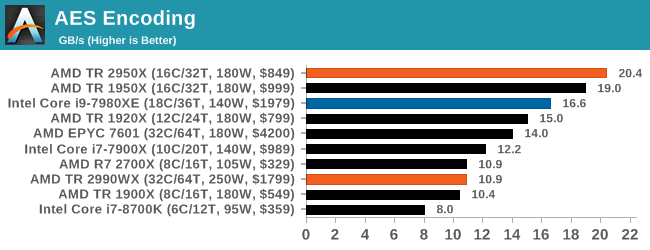
Normally we see this test go very well when there are plenty of cores, but it would seem that the bi-modal nature of the cores and memory controllers in the 2990WX gives a poor result. The EPYC 7601, with eight memory controllers, does a better job, however the 1950X wins here. The 2950X, where all cores have a similar access profile, scores top here, well above Intel’s 18-core Core i9.










171 Comments
View All Comments
Lolimaster - Monday, August 13, 2018 - link
Then build one yourself.tmnvnbl - Monday, August 13, 2018 - link
How did you measure power numbers for core/uncore? Did these validate with e.g. wall measurements? The interconnect power study is very interesting, but I would like to see some more methodology there.seafellow - Monday, August 13, 2018 - link
I second the ask...how was measurement performed? How can we (the readers) have confidence in the numbers without an understanding of how the numbers were generated?GreenReaper - Wednesday, August 15, 2018 - link
Modern CPUs measure this themselves. AMD itself has boasted of the number of points at which they measure power usage throughout its new CPUs. Check out 'turbostat' in the 'linux-cpupower' package - or grab a copy of HWiNFO that will show it.Darty Sinchez - Monday, August 13, 2018 - link
This here article be awesome. I is so ready to buy. But, me no have enough money so I wait for it sale.perfmad - Monday, August 13, 2018 - link
So is the 2990WX bottlenecking in Handbrake because of the indirect memory access for some cores? Would be interesting to know if that bottleneck can be worked around by running multiple encodes simultaniously, The latest Vidcoder beta uses the handbrake core and has recently added support for multiple simultanous encodes. Would be really appreciated if you had time to look into that.Also do you share the source file and presets you use for the handbrake tests so we can run them on our hardware to get a comparison? My CPU isn't one you've tested.
Thanks for the review thus far.
AlexDaum - Monday, August 13, 2018 - link
I think, the problem with the memory bandwidth cannot be easily fixed, as it isn't a Problem, that one Process uses to much memory, but one core on one of the dies without memory controller, needs to access the infinity fabric to get Data. When all of the cores are active and want to fetch data from memory, it would cause contention on the IF Bus, which reduces the available memory bandwidth a whole lot and the core is just waiting for memory.This is just my speculation though, not based on facts, other than the bottleneck.
Aephe - Monday, August 13, 2018 - link
Those 2990WX Corona results! Can't wait to get a machine based on this baby! Holding up for TR2 release was worth it for me at least.Ian Cutress - Monday, August 13, 2018 - link
That benchmark result broke my graphing engine ! Had to start reporting it the millions.melgross - Monday, August 13, 2018 - link
It’s interesting. This reminds me of Bulldozer, where they made a bad bet with floating point (among some other things), and that held then back for years. This looks almost too specialized for most uses.